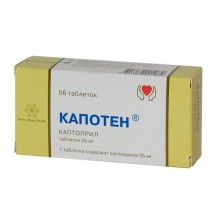



Competitive ACE inhibitor - an enzyme that promotes the conversion of angiotensin I to angiotensin II.
Kapoten has an antihypertensive effect, reduces round congestion (afterload), preload and resistance in the pulmonary vessels; increases heart volume and exercise tolerance.
With prolonged use reduces the severity of left ventricular myocardial hypertrophy, prevents the progression of heart failure and slows down the development of left ventricular dilatation.
- arterial hypertension (as monotherapy and in combination with other antihypertensive drugs, for example, with thiazide diuretics);
- chronic heart failure (as part of combination therapy);
- IHD (left ventricular dysfunction after myocardial infarction in patients in a stable clinical condition);
- diabetic nephropathy (microalbuminuria> 30 mg / day) for insulin-dependent diabetes mellitus.
1 tablet contains captopril 25 mg.
Excipients: lactose, corn starch, microcrystalline cellulose, stearic acid.
Captopril is marketed under different brands and generic names, and comes in different dosage forms:
| Brand name | Manufacturer | Country | Dosage form |
|---|---|---|---|
| Capoten | Akrikhin | Russia | pills |
| Captopril | Pharmacor Production | Russia | pills |
| Captopril | Sandoz | Switzerland | pills |
| Captopril-STI | AVVA RUS | Russia | pills |
| Captopril | Ozon | Russia | pills |
No customer reviews for the moment.
Doses of Capoten should be selected by a doctor. Inside, one hour before meals, 25-50 mg 2-3 times a day (but not more than 450 mg per day), for children the initial dose is 0.15-0.3 mg / kg (but not more than 6 mg / kg per day).
Since the cardiovascular system: orthostatic hypotension, tachycardia, peripheral edema.
On the part of the respiratory system: dry cough, bronchospasm, pulmonary edema.
Allergic reactions: angioedema of the extremities, face, lips, mucous membranes, tongue, pharynx or larynx.
From the water and electrolyte balance: hyperkalemia (most likely with renal failure), hyponatremia (most often with a salt-free diet and simultaneous use of diuretics.
From the urinary system: proteinuria, an increase in the content of urea nitrogen and creatinine in the blood plasma, acidosis.
From the hemopoietic system: in rare cases - neutropenia, agranulocytosis, thrombocytopenia and anemia, a positive test for antibodies to the nuclear antigen. In patients with normal renal function (QC less than 1.6 mg / dL) in the absence of other complicating factors, neutropenia was observed in 0.02% of cases.
From the digestive system: reversible and usually self-impaired taste, dry mouth, aphthous stomatitis; rarely - abdominal pain, diarrhea, gingival hyperplasia, hepatitis, elevated levels of liver transaminases in the blood plasma, hyperbilirubinemia.
Dermatological reactions: maculo-papular rash, usually accompanied by itching and, in rare cases, fever; hyperemia, vesicular or bullous eruptions, erythema (including Stevens-Johnson syndrome), photosensitization.
From the side of the central nervous system and peripheral nervous system: headache, dizziness, ataxia, paresthesias, drowsiness, visual disturbances.
- Quincke edema (hereditary or associated with the use of ACE inhibitors in history);
- pronounced impaired renal function;
- severe liver dysfunction;
- hyperkalemia;
- bilateral renal artery stenosis or arterial stenosis of a single kidney with progressive azotemia;
- condition after kidney transplantation;
- Aortic stenosis and similar obstructive changes that impede the flow of blood from the left ventricle;
- pregnancy;
- lactation period (breastfeeding);
- hypersensitivity to the drug and other ACE inhibitors.
Diuretics, vasodilators, ganglioblockers, adrenergic blockers with simultaneous use enhance the antihypertensive effect of the drug Capoten.
Indomethacin and other NSAIDs, as well as clonidine, can reduce the antihypertensive effect of the drug Capoten.
Against the background of the simultaneous use of Capoten with allopurinol and procainamide, neutropenia and / or Stevens-Johnson syndrome may be observed, but the causal relationship of these phenomena is not clear.
With simultaneous use of immunosuppressants (eg, azathioprine and cyclophosphamide) with Capoten, the risk of hematological disorders increases.
Against the background of simultaneous use of probenecid, captopril excretion with urine is reduced.
The simultaneous use of salts of lithium and Capoten can lead to an increase in the concentration of lithium in the blood serum. This increases the risk of side effects and toxic effects of lithium preparations.
Simultaneous use of Capoten with potassium-sparing diuretics (triamterene, amiloride, and spironolactone) or potassium preparations may lead to hyperkalemia.
Caution should be given to Capoten for collagenoses due to the increased risk of neutropenia and agranulocytosis.
In the appointment of the drug to patients with severe disorders of water and electrolyte balance should carry out the correction of this condition.During treatment with Capoten, it is not recommended to take potassium-sparing diuretics or potassium preparations, especially for patients with severe impaired renal function.
Angioedema of the extremities, face, lips, mucous membranes, tongue, pharynx, or larynx is observed in patients using ACE inhibitors, including captopril. If the swelling is limited to the face and lips, this condition usually disappears after discontinuation of the drug. Antihistamines may be used to alleviate the clinical symptoms. Patients should be under the supervision of a physician until the symptoms disappear. If the edema covers the tongue, pharynx, or larynx with the threat of airway obstruction, a subcutaneous solution of 0.5 ml of 0.1% epinephrine solution should be injected.
During treatment with Capoten, low-sodium diets are indicated.
Kapoten can cause a false positive reaction when analyzing urine for acetone.
Use in Pediatrics
Safety and efficacy of the drug in children have not been studied.
Symptoms: pronounced decrease in blood pressure.
Treatment: effective administration of plasma-substituting drugs and hemodialysis.
Studies and clinical trials of Captopril (Click to expand)